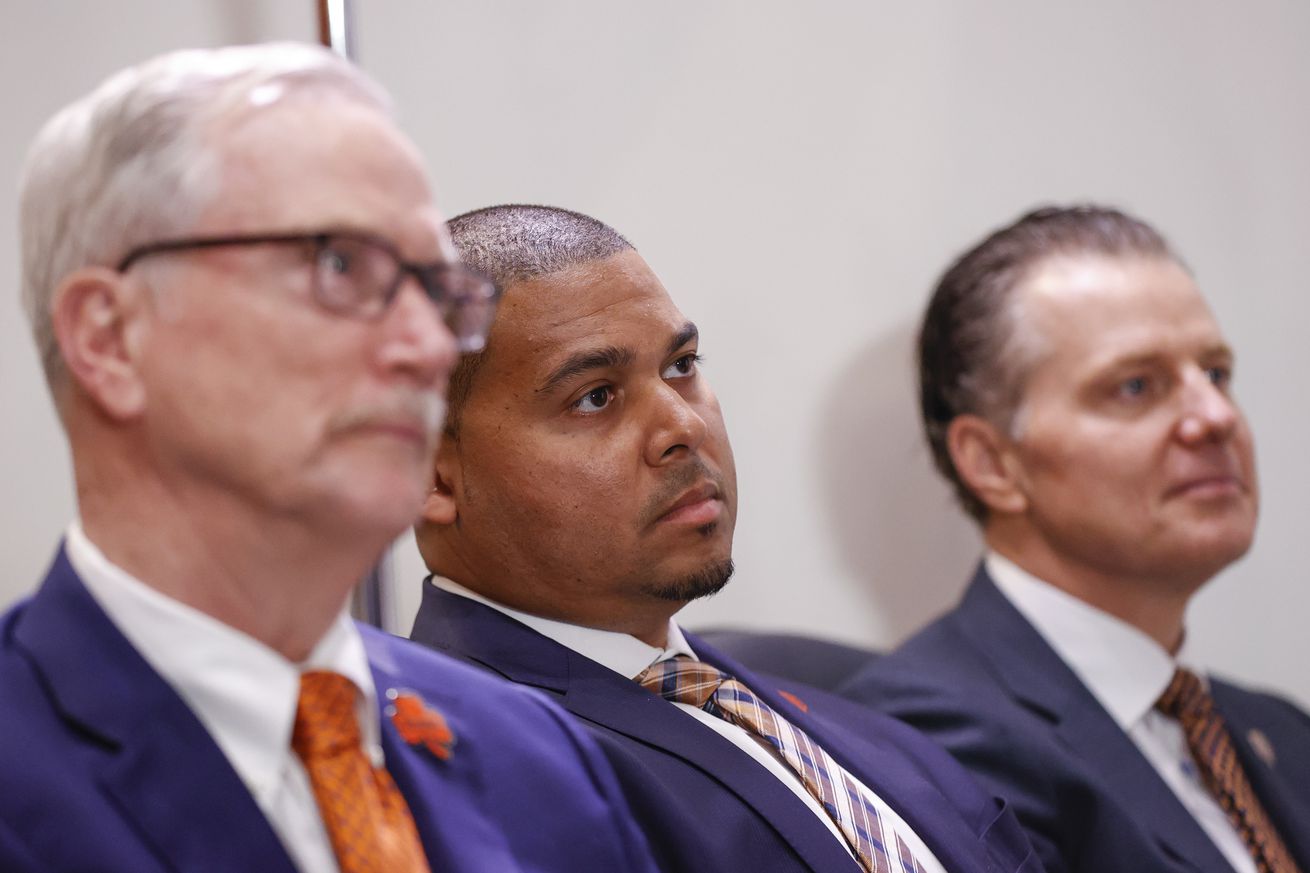
A new report shows how agents, like Athletes First’s Trace Armstrong, essentially run the Bears’ hiring process — to their detriment.
So, you thought the Chicago Bears couldn’t possibly look more embarrassing after last year’s travesty of a season? You forgot the first truth of being a Bears fan: it can always get worse.
Want proof? Check out the new report from ESPN’s Kalyn Kahler that just exposed this franchise — one of the NFL’s oldest and (on paper) most respected organizations — for the dysfunctional, insular, country club-esque clown show it really is, as well as calling out the league itself for the fraudulent “meritocracy” it claims to promote.
Long story short: the Bears, like many other teams, have allowed agents, like influential Athletes First’s Trace Armstrong, to hijack their coaching and front-office hires, installing their hand-picked candidates and even packaging certain head coach-supervisor combos to increase their influence across the league.
Chicago is one of five teams, including Arizona, Cleveland, Kansas City and the New York Giants, to enter the 2024 season with a head coach and general manager represented by the same agency. (Ryan Poles and Matt Eberflus are both represented by Armstrong and Athletes First.)
Additionally, Armstrong and his agency represented three recently employed previous Bears offensive coordinators — Shane Waldron, Luke Getsy, and Mark Helfrich (under former head coach Matt Nagy) — as well as special teams coach Richard Hightower, QBs coach Kerry Joseph, and Nagy himself.
Kahler’s story also describes the events leading to Poles hiring Eberflus — originally (and perhaps falsely) labeled as an NFL “growth and development summit” — as potentially being an agency summit meant to connect front-office supervisors with head coaching candidates for pairing purposes.
(Poles chose the first-year head coach Eberflus over Dan Quinn, who just led the Washington Commanders to the playoffs, and Jim Caldwell, an offensive-minded coach who was the last coach before Dan Campbell to lead the Detroit Lions to the playoffs. Neither Quinn nor Caldwell are Athletes First clients.)
For those keeping score at home, that’s two straight head-coaching hires and several important hires along each of those staffs — and no sustained success in either case.
(Apparently, the Bears thought “linking” the head coach and general manager meant making sure they had the same agent, not the same organizational timeline or vision. Maybe that explains why they wouldn’t fire Eberflus after 2023 despite it clearly being the right thing to do.)
This is your absolute MUST READ for #DaBears today. Scathing on McCaskey
There’s so much in here I wanted to screen shot the whole thing.
Also… The idea of “package deal” for Flus & Poles is something we’ve long suspected but haven’t openly talked about.
Woof #DaBears https://t.co/Vx1zAhREC9 pic.twitter.com/HwkALuOma7
— Jeff Berckes (@gridironborn) January 17, 2025
Yet, the football-illiterate McCaskeys have continued relying on Armstrong, with whom they’ve had a relationship since drafting him to Chicago in 1989, to help out with their staffing searches because they have no bag of their own.
As bad as this looks for the Bears, though, Kahler also connects the agent-driven hiring pool with the dearth of respect for minority coaching candidates and the “Rooney Rule.”
Even as NFL coaches and front offices increasingly lean on agents to help network and expand their spheres of influence, Kahler’s reporting shows (unsurprisingly) that coaches of color are being excluded from the process. What’s more: NFL commissioner Roger Goodell knows this and has specifically questioned agencies about it.
Of 24 coaches and general managers considered part of “package deals” by the NFL, only four were people of color, according to the report. Poles, for example, is reportedly the only non-white supervisor on Armstrong’s client list.
Why does that matter, you ask?
Because, again, the NFL keeps proving it’s not a meritocracy. It’s an old boys’ club that keeps cycling through people based on connections and comfort level rather than qualifications.
That fact gets highlighted in a new way now when teams flout the Rooney Rule, which is designed to increase opportunities for deserving minority coaching candidates who have traditionally been excluded from head coaching and general manager spots because of practices like this.
But for those who immediately get turned off by the idea of talking about “race” or even want to discredit its mention here, think for a moment about what’s really at the heart of the rule and the NFL’s push for adding diversity to its coaching and supervisory ranks.
It’s not about “handouts” or promoting “less-qualified” people based on nothing by color. It’s about pushing teams to interview a wider range of qualified candidates, not just the ones they already know or agents put in front of them — and highlighting how dumb organizations look for continually neglecting to do that.
(If you still think getting rid of the rule would ensure only the most qualified people get jobs after reading this, I have a white-sand beach in Lake Forest to sell you.)
Unfortunately, the Bears once again proved themselves one of the league’s biggest failures year in and year out for modeling business practices.
(Also, just to be clear: that’s not me calling the Bears “racist.” I just think they’re incompetent. Those two things aren’t mutually exclusive, of course, but in this case they’re just bad for bad’s sake.)
After all, they keep on running wide coaching searches with a myriad of potential candidates, including coaches of color. But if you keep asking yourself how they consistently pick the wrong ones — or alienate worthy candidates who might otherwise be interested — here you go.
Until the Bears start operating more like a true business rather than a family-owned one, they’ll remain susceptible to these types of pitfalls and keep subjecting their fans to more brutal bouts of shame — and themselves to more humiliating exposès revealing their absurdity.